“I got more from watching a garden YouTube video than this whole term at PSU,” said Kyle Leslie-Christy, president of the Associated Students of Portland State University (ASPSU). “I don’t think the education at PSU is as valuable as what we’re paying for right now.”
Interim President Stephen Percy sent a campus-wide email on May 12 informing the PSU community of a probable 4.9% increase in residential undergraduate tuition. For Leslie-Christy, the increase in tuition is not justified by the decrease in the quality of education that came with the switch to remote learning.
While the university is in financial straits, Leslie-Christy said students should not bear the onus of keeping PSU afloat. “I think the whole conversation should be around lowering tuition right now,” Leslie-Christy said. He will not attend PSU for graduate school so long as learning remains remote and tuition continues to rise.
Alexandra Modjeski, the vice president of ASPSU, said the administration needs to find a balance. “We understand the university needs to function monetarily, but if you lose students, you’re not going to function at all,” she said.
Motu Sipelii, who will be president of ASPSU for the 2020–21 academic year, said the yearly increases in tuition add up: “I’ve been at PSU for three years and they’ve increased tuition by 20%.” Tuition records for 2015–17 are currently inaccessible on PSU’s page for tuition and fees for prior academic years. However, available data shows since 2014, tuition has increased 24% for residential undergraduates taking 16 credits.
Non-resident students like Sipelii pay two to three times as much as resident students, according to the 2019–20 tuition and fee tables on PSU’s Tuition and Fees page.
Leslie-Christy said the student experience has undergone drastic changes over the past few decades, which can create barriers to communicating with administration. He said there is a disconnect between the lived experience of current students and those who attended college decades ago. “All these people that went to college in 1980 and ‘90 and the early 2000’s—was tuition raising every three years by 20%? I don’t think so.”
ASPSU’s leadership considers Stephen Percy
On May 11, the Board of Trustees recommended Percy as president of PSU—a decision probably expedited by the need for stable leadership amid the uncertainty of a pandemic, according to Modjeski.
Although ASPSU has not yet decided on an official stance regarding Percy, Leslie-Christy has a positive opinion of him: “I felt like he was very willing to listen to students.” Leslie-Christy is enrolled at the College of Urban and Public Affairs, where Percy was formerly dean. Leslie-Christy said he was impressed by the college’s work, which he attributes partly to Percy’s leadership.
“[Percy] seems like a completely genuine person with the best interests of both students and the university in mind,” Modjeski said about Percy. “He definitely has a perspective that could help organize the university.”
Leslie-Christy and Modjeski agreed it would be beneficial for the next president to be someone from within PSU.
Modjeski contrasted Percy with former PSU president Rahmat Shoureshi, who Percy replaced. “He didn’t really care to understand the culture of PSU,” she said. “I think Percy is an advantageous candidate because of his understanding.”
ASPSU meets with Board of Trustees
The Board of Trustees arranged an emergency meeting with ASPSU on Friday, May 22. Leslie-Christy, Modjeski, Sipelii and Sipelii’s vice president Victor Chavez met with Board members Yves Labissiere, Christine Vernier and Judith Ramaley to share their thoughts about the Board’s recommendation of Percy as president.
Modjeski said they discussed ASPSU’s views on what would make a good president. “We talked about wanting the relationship between students and faculty to be pretty symbiotic,” she said.
In the past, there was an adversarial tone within student government, which “didn’t make administrators want to associate themselves with ASPSU at all,” according to Leslie-Christy,
“But we did a good job of turning that around.”
“It was a really great conversation,” Modjeski said. “More successful because the culture around the conversation seemed to have shifted a bit, in a good way.”
Modjeski said both ASPSU and the Board of Trustees seek to form closer ties and a better working relationship. “Ultimately, I think they were incredibly receptive,” she said.
Leslie-Christy, Modjeski and Sipelii all emphasized the need for mutual respect in communication between students and administration. “We recognize that we have so much political lobbying power,” Modjeski said. “The most efficient way for us to get the students’ voices is to continue to have those conversations. And that’s what we will continue to do with the Board of Trustees.”
